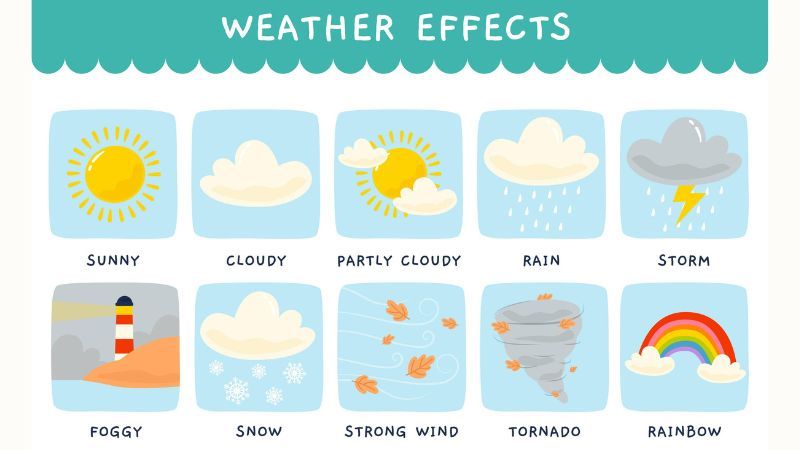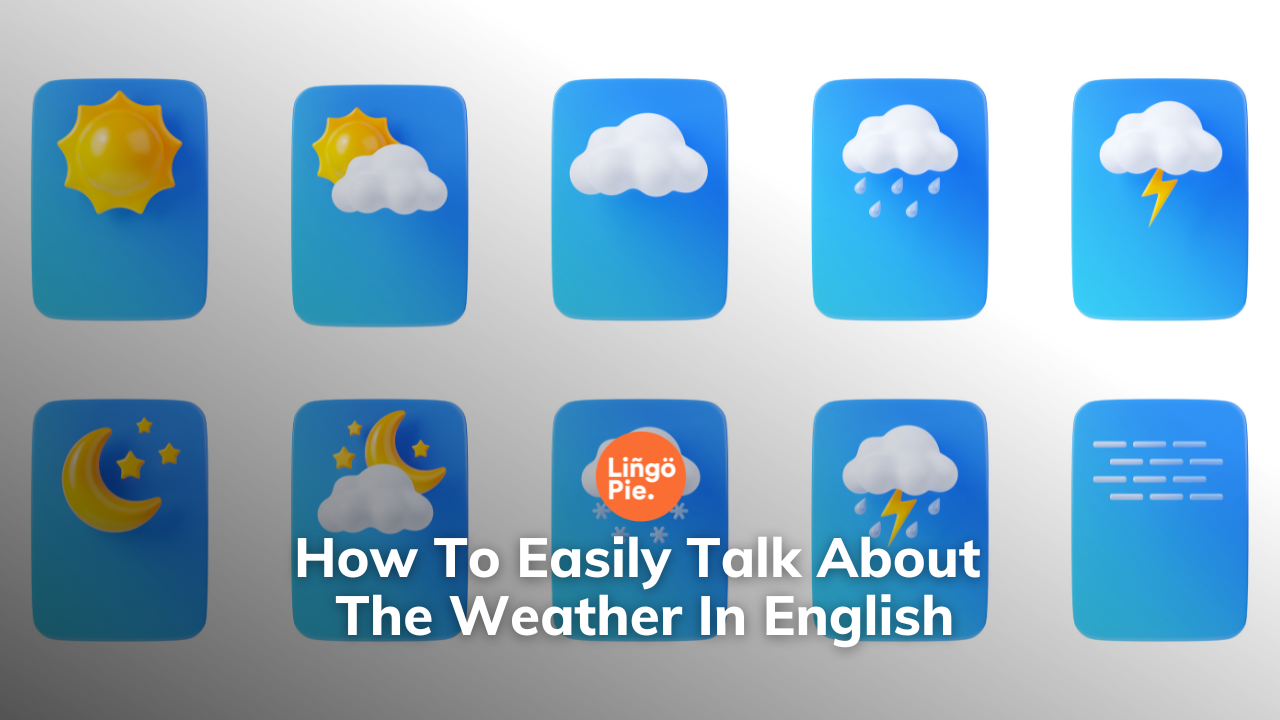Have you ever noticed how easy it is to strike up a conversation about the weather? Whether you're waiting in line at the grocery store or meeting someone for the first time, talking about the weather is like a universal language that everyone understands.
In this blog post, we're going to dive into why these weather chats are so important. From breaking the ice to making plans for the weekend, discussing the weather isn't just small talk—it's a way to connect with others and understand the world around us.
So, if you've ever felt unsure about how to learn English by talking about the weather, you're in the right place!

Vocabulary for Weather Talk
When it comes to discussing the weather in English, having the right vocabulary at your fingertips is essential. Here's a breakdown of some key terms you'll need to confidently navigate weather conversations:
Basic Weather Conditions
- Sunny: When the sky is clear, and the sun is shining brightly.
- Cloudy: When the sky is covered with clouds and lacks direct sunlight.
- Rainy: When precipitation falls from the sky in the form of raindrops.
- Snowy: When precipitation falls from the sky in the form of snowflakes.
- Windy: When there is a significant amount of air movement, often accompanied by gusts.
- Humid: When there is a high level of moisture in the air, often leading to a feeling of stickiness or heaviness.
- Foggy: When the visibility is reduced due to a thick layer of fog near the ground.
- Stormy: When there are strong winds, heavy rain or snowfall, and possibly thunder and lightning.
- Overcast: When the sky is completely covered with clouds, resulting in dull or gloomy lighting conditions.
Temperature Expressions
- Hot: When the weather is warm to a high degree, causing discomfort due to heat.
- Warm: When the weather is moderately hot and comfortable.
- Cool: When the weather is moderately cold but not uncomfortably so.
- Cold: When the weather is very chilly, often requiring extra layers to stay warm.
By familiarizing yourself with these weather-related terms, you'll be better equipped to engage in conversations about the weather with ease and confidence. So, whether you're discussing the scorching heat of summer or the frosty chill of winter, you'll have the right words to express yourself clearly and accurately.

Phrases for Weather Talk
Engaging in weather talk often involves using specific phrases and expressions to initiate, maintain, or contribute to the discussion. Here are some examples of phrases commonly used in weather talk:
Greetings and Openers
- "Nice weather we're having, isn't it?"
- "How's the weather treating you today?"
- "Lovely day, isn't it?"
- "Looks like we're in for some sunshine today!"
Small Talk
- "Did you catch the forecast for this weekend?"
- "I heard it's going to be quite windy tomorrow."
- "Seems like we're in for a bit of rain later."
- "Have you seen how warm it's getting lately?"
Sharing Experiences
- "I love it when it's sunny like this. Makes me want to spend the whole day outdoors."
- "Last winter, it was so cold that the pipes froze in my house."
- "I remember a particularly stormy day when I got caught in the rain without an umbrella."
- "Growing up in a coastal town, foggy mornings were a common sight."
Planning Activities
- "Do you think it will rain later? I'm planning a picnic."
- "Since it's supposed to snow tomorrow, maybe we should reschedule our hike."
- "With this heatwave, I'm thinking of heading to the beach this weekend."
- "I'll bring an extra jacket just in case it gets chilly during the outdoor concert."
Using these phrases and expressions can help you smoothly navigate weather conversations, whether you're making small talk with a colleague or planning activities with friends and family. So, next time you find yourself discussing the weather, don't hesitate to use these handy phrases to keep the conversation flowing!
Tips for Improving Weather Talk Skills
Engaging in weather conversations might seem straightforward, but honing your skills can make your interactions more meaningful and enjoyable. Here are some practical tips to enhance your weather talk abilities:
1. Practice with Native Speakers
There's no better way to improve your weather talk skills than by practicing with native speakers. Whether it's chatting with friends, participating in language exchange groups, or striking up conversations with locals during your travels, engaging in real-life interactions allows you to observe natural speech patterns, learn English colloquial expressions, and receive immediate feedback.
Don't be afraid to make mistakes; native speakers are often understanding and supportive, and each conversation is an opportunity to learn and grow.
2. Listen to Weather Forecasts in English
Listening to weather forecasts in English is an excellent way to familiarize yourself with weather-related vocabulary and expressions. Tune in to radio broadcasts, watch television weather reports, or follow online weather updates to expose yourself to a variety of linguistic styles and delivery methods. Pay attention to how meteorologists describe weather conditions, temperature fluctuations, and forecast uncertainties, and try to incorporate similar phrases into your own conversations.
Additionally, listening to weather forecasts allows you to practice comprehension skills and become more adept at interpreting weather-related information.
3. Learn More Vocabulary and Expressions
Building a robust vocabulary and repertoire of expressions is key to becoming a proficient weather conversationalist. Take the time to learn new weather-related terms, including synonyms for common conditions (e.g., scorching instead of hot, drizzly instead of rainy) and idiomatic expressions (e.g., under the weather, rain or shine). Experiment with incorporating these words and phrases into your conversations, and pay attention to how they are received by others.
Additionally, consider keeping a weather journal where you document different weather conditions and the corresponding vocabulary used to describe them, allowing you to reinforce your learning through practice and repetition.
By following these tips and dedicating time to practice, you can sharpen your weather talk skills and become more confident and proficient in discussing the weather in English. Whether you're engaging in casual chit-chat or navigating more in-depth discussions, mastering the art of weather talk opens doors to meaningful connections and enriching cultural exchanges.
Learn English through TV Shows with Lingopie!
Ready to learn English in a fun and immersive way? Lingopie's got you covered! Dive into a world of American TV shows and movies, handpicked to help you learn the English language naturally.
With Lingopie's easy-to-use platform, you can enjoy your favorite entertainment while picking up new words and phrases. Whether you're into American or British TV shows, sitcoms, or cartoons, Lingopie has something for you.
Start learning English while having fun with Lingopie!
Download Lingopie from the App Store or Play Store now and get a FREE 7-day trial!
Final Words
Alright, let's wrap this up. Talking about the weather might seem like no big deal, but it's actually pretty important for connecting with people and understanding different cultures. We've covered a lot—how weather chat is a social norm, how it varies by region, and why it matters in our everyday lives.
Now, here's the deal: practice is key. Talk to native speakers, listen to weather forecasts in English, and keep learning new words and phrases. The next time you're out and about, don't be shy—strike up a conversation about the weather! It's a simple way to improve your English skills and make connections with others.








![20+ Gen Alpha Slang And What They Mean [Guide]](/blog/content/images/size/w300/2025/06/Gen-Alpha-Slang.jpg)
